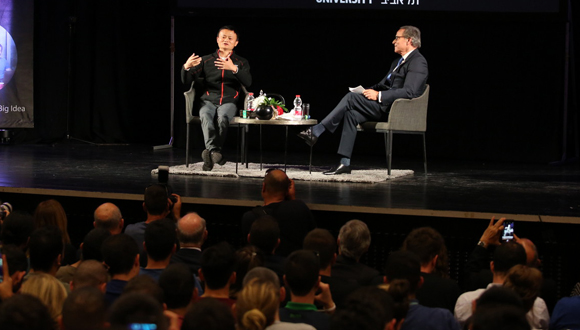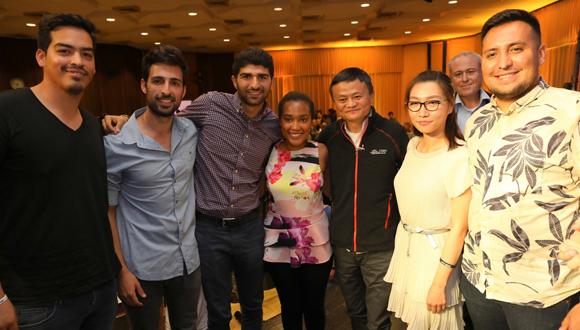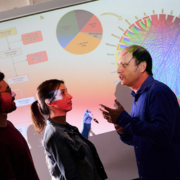Founder of Chinese e-commerce giant visits TAU
Jack Ma, executive chairman of Alibaba, says the most important skill for the future is creativity
Have you ever bought anything on Aliexpress.com? The website is hugely popular with shoppers across the world, and offers everything from cheap electronics to clothes to children’s toys and anything else you can imagine. The website was created by the Alibaba Group, a giant in the world of e-commerce. Established in China, Alibaba is one of the ten biggest companies in the world, and its worth is currently estimated to be $527 billion.
Last week the man who started it all, Jack Ma, lead founder of Alibaba, stopped by Tel Aviv University to speak with students and professors and to receive an honorary doctorate. Mr. Ma said coming to Israel was like a “dream come true”.
“Arriving here was nothing like I expected,” he said. “I was told it wasn’t safe here, that there were bombs and guns everywhere. But when I arrived I saw this place was so peaceful, and the economy is booming. I think you shouldn’t read about Israel, you should come here, feel Israel, touch Israel. That’s why I brought 40 members of the Alibaba board of directors with me on this visit.”
During a meeting with students and professors – at which Mr. Ma insisted only students be allowed to ask questions – Mr. Ma also stressed the other major component of Alibaba’s success: creativity.
The most important skill is creativity
When asked which majors or subjects students should focus on in the future, Mr. Ma said: “Don’t study what your father wants you to study, that’s what I tell my kids. I think that’s the most important thing today – study what you’re good at, what you love, what you really want to do for the rest of your life.”
“Machines will take a lot of human jobs in the future,” he added. “Which is why we can’t educate our children as we have before. We have to teach them to be creative and innovative, those are things machines will never be able to do. Those are the most important qualities to have for the future.”
Mr. Ma also stressed the importance of continued learning, and how education should prepare young people to constantly evolve within their chosen field. “I always say, an expert is someone who only knows about the past,” he said. “There are no experts on the future. We don’t hire people because they already know how to do what we need them to do, we hire them because we think they can learn with us, develop with us. We want people who aren’t afraid to fail. Alibaba’s path has been full of failures. You have to know how to get up again and never give up.”
A former educator himself, Mr. Ma stressed the importance of education. He also believes the ties between Israel and China will only grow closer in the future.

Jack Ma answers questions from TAU students (photo: Chen Galili)
An Israeli success story?
“You don’t have diamonds in Israel,” Mr. Ma said during his speech, “but you have the largest diamond exchange in the world. You don’t make cars, but you have the most advanced technology related to car manufacturing. You don’t have water, or any natural resources, but you’ve made yourselves so strong. When Alibaba was founded we also didn’t have money or technology. No one believed we might succeed. We had problems, we made a lot of mistakes. But we did one thing right: we never gave up.”
But despite these similarities, it’s not always easy for Israeli companies to succeed in China. According to Prof. Gadi Ariav, an expert on the Chinese economy from the Coller School of Management, if Israelis want to do business in China they should learn from Jack Ma and Alibaba’s approach.
“The centralized government in China actively supported the development of local tech companies, and made it difficult for foreign companies to operate there,” Prof. Ariav said. “The e-commerce giant eBay tried to operate in China but had to admit failure about a decade ago, clearing the way for Taobao. eBay tried to apply a global model to business in China, while Taobao used its intimate knowledge of the Chinese civilization to adjust its commercial parameters as well as the tech design to the unique local market.”
Prof. Ariav believes Israeli entrepreneurs should “do their homework” if they’d like to succeed in China. “That doesn’t always come naturally to Israelis,” he said.
It seems like Jack Ma’s visit to TAU might be a milestone in offering Israelis a window into how business in China operates. So, although the saying goes – if you do what you love you’ll never work a day in your life, it sounds like if you follow Jack Ma’s advice you might just end up working for Alibaba.
Watch the full video of Mr. Ma's Q&A with TAU students:






